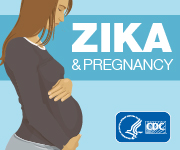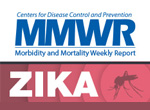COCA Email Updates: July 18 – August 1
If you have any questions on these or other clinical issues, please write to us at coca@cdc.gov
Available for download: August 1, 2016, COCA Email Update
COCA News and Announcements
Upcoming COCA Calls:
Assessing Benefits and Harms of Opioid Therapy for Chronic Pain
Date: Wednesday, August 3, 2016
Time: 2:00 - 3:00 pm (Eastern Time)
Participate by Phone:
- U.S. Callers: 800-779-0686
- International Callers: 312-470-0194
Webinar: https://www.mymeetings.com/nc/join.php?i=PW8523117&p=3377346&t=c
Although evidence supports short-term effectiveness of opioids to treat pain, there is insufficient data that long-term use of opioids effectively treats chronic pain. In fact, long-term use of opioids in high doses can contribute to opioid-use disorder and overdose. Therefore, long-term opioid therapy should only be used when the benefits outweigh the risks. During this COCA Call, presenters will explore a case study on how recommendations from the CDC Guideline for Prescribing Opioids for Chronic Pain were used to ascertain the associated benefits and risks when a patient with fibromyalgia was prescribed oxycodone following a motor vehicle crash.
NEW: Updated Interim Zika Clinical Guidance for Pregnant Women and Data on Contraceptive Use to Decrease Zika-affected Pregnancies
Date: Wednesday, August 9, 2016
Time: 2:00 - 3:00 pm (Eastern Time)
Participate by Phone:
- U.S. Callers: 888-942-9686
- International Callers: 517-308-9076
Webinar: https://www.mymeetings.com/nc/join.php?i=PW9512922&p=4687942&t=c
CDC’s top priority for the Zika response is to protect pregnant women and their fetuses from the adverse effects of Zika virus infection in pregnancy. As a result, CDC continues to evaluate all available evidence and update recommendations as new information becomes available. CDC has updated its interim guidance for U.S. healthcare providers caring for pregnant women with possible Zika virus exposure based on emerging evidence about laboratory testing for the diagnosis of Zika. A primary strategy to reduce Zika-related pregnancy complications is to prevent pregnancy among women who want to delay or avoid pregnancy. CDC published contraceptive use data for states where mosquito-borne transmission of Zika is possible. During this COCA Call, clinicians will learn about the updated CDC interim guidance for caring for pregnant women with possible Zika virus exposure, and strategies for increasing access to contraceptive methods and services to minimize the number of pregnancies affected by Zika.
Recent COCA Calls:
CDC Recommendations for Nonopioid Treatments in the Management of Chronic Pain
Date: Wednesday, July 27, 2016
During this COCA Call, a case study was used to illustrate how clinicians can identify appropriate treatment strategies for chronic pain. In addition, clinicians learned about the effectiveness and risks of nonpharmacologic and nonopioid pharmacologic treatments for chronic pain.
Archived COCA Conference Calls
Free continuing education credits (CME, CNE, ACPE, CEU, CECH, and AAVSB/RACE) are available for most calls. More information about free CE.
CDC Emergency Response
2016 Zika Virus
NEW: Key Messages—Zika Virus
A collection of the most up-to-date and cleared information on the ongoing Zika virus outbreak.
http://www.cdc.gov/zika/pdfs/zika-key-messages.pdf
Updated: Zika Virus Information for Healthcare Providers
CDC's Zika webpage for healthcare provider resources.
http://www.cdc.gov/zika/hc-providers/index.html
Zika Virus: Information for Clinicians Slide Set
Fact Sheets and Posters in Different Languages
CDC fact sheets and posters for distribution to patients are available in languages, including Spanish, Arabic, Tagalog, Vietnamese, Mandarin, Creole, and Korean. These resources cover a variety of topics, including travel information, insect repellent, sexual transmission, and mosquito control.
Clinicians Caring for Pregnant Women and Women of Reproductive Age
NEW: MMWR Interim Guidance for Health Care Providers Caring for Pregnant Women with Possible Zika Virus Exposure — United States, July 2016
To increase the proportion of pregnant women with Zika virus infection who receive a definitive diagnosis, CDC recommends expanding real-time reverse transcription–polymerase chain reaction (rRT-PCR) testing.
Clinical Consultation Service for Healthcare Providers Caring for Pregnant Women with Possible Zika Virus Infection
CDC maintains a 24/7 consultation service for healthcare providers caring for pregnant women with possible Zika virus infection. This consultation service is NOT for patients or the general public. To contact the service, email ZikaPregnancy@cdc.gov or call 770-488-7100.
Tools for Health-Care Providers
View printable and easy to use CDC fact sheets, guidance documents, and testing algorithms for Zika virus infection.
Outcomes of Pregnancies with Laboratory Evidence of Possible Zika Virus Infection in the United States
CDC will report two types of outcomes:
- - Live-born infants with birth defects
- - Pregnancy losses with birth defects
Doctor’s Visit Checklist: For Pregnant Women Who Traveled to an Area with Zika
Doctor’s Visit Checklist: For Pregnant Women Living in an Area with Zika
MMWR: Interim Guidance for Health-Care Providers Caring for Women of Reproductive Age with Possible Zika Virus Exposure — United States, 2016
CDC has updated its interim guidance for U.S. health-care providers caring for women of reproductive age with possible Zika virus exposure to include recommendations for counseling women and men with possible Zika virus exposure who are interested in conceiving. The updated guidelines also include recommendations for Zika virus testing and guidance for women residing along the US-Mexico Border.
MMWR: Preventing Transmission of Zika Virus in Labor and Delivery Settings Through Implementation of Standard Precautions — United States, 2016
CDC recommends Standard Precautions in all health-care settings to protect both health-care personnel and patients from infection with Zika virus as well as from blood-borne pathogens (e.g., human immunodeficiency virus [HIV] and hepatitis C virus [HCV]).
Clinical Guidance for Healthcare Providers Caring for Pregnant Women
Clinical Guidance for Healthcare Providers Caring for Women of Reproductive Age
Clinicians Caring for Infants and Children
Clinical Guidance for Healthcare Providers Caring for Infants & Children
Congenital Microcephaly Case Definitions
Interim Guidelines for Health-Care Providers Caring for Infants and Children with Possible Zika Virus Infection — United States, February 2016
CDC has updated its interim guidelines for U.S. health-care providers caring for infants born to mothers who traveled to or resided in areas with Zika virus transmission during pregnancy and expanded guidelines to include infants and children with possible acute Zika virus disease.
Sexual Transmission
NEW: MMWR: Interim Guidance for Prevention of Sexual Transmission of Zika Virus — United States, July 2016
CDC is expanding its existing recommendations to cover all pregnant couples, which includes pregnant women with female sex partners. This guidance also describes what other couples (those who are not pregnant or planning to become pregnant) can do to reduce the risk for Zika virus transmission.
Travel Information
NEW: MMWR: Ongoing Zika Virus Transmission — Puerto Rico, November 1, 2015–July 7, 2016
The Zika virus outbreak in Puerto Rico continues to expand in geographic extent and number of infected persons. Residents of and travelers to Puerto Rico should continue to employ mosquito bite avoidance behaviors, take precautions to reduce the risk for sexual transmission, and seek medical care for any acute illness with rash or fever.
CDC Issues Advice for Travel to the 2016 Summer Olympic Games
Clinical Evaluation and Testing
Zika Virus Resources for Laboratories
Testing for Zika Virus
Contact your state or local health department to facilitate testing.
Official CDC Health Alert Network (HAN) Health Update - CDC Recommendations for Subsequent Zika IgM Antibody Testing
Testing for Zika virus infection using real-time reverse-transcription polymerase chain reaction (rRT-PCR) molecular assays is now commercially available. CDC provides further recommendations for actions to take when requesting Zika rRT-PCR testing from a commercial laboratory.
MMWR: Interim Guidance for Interpretation of Zika Virus Antibody Test Results
If serologic testing indicates recent flavivirus infection that could be caused by either Zika or dengue virus, patients should be clinically managed for both infections because they might have been infected with either virus. Patients with clinically suspected dengue should receive appropriate management to reduce the risk for hemorrhagic medical complications.
MMWR: Interim Guidance for Zika Virus Testing of Urine - United States, 2016
CDC and OSHA Issue Interim Guidance for Protecting Workers from Occupational Exposure to Zika Virus
CDC and the Occupational Safety and Health Administration (OSHA) issued new guidance and information for protecting workers from occupational exposure to Zika virus.
Biosafety Guidance for Transportation of Specimens and for Work with Zika Virus in the Laboratory
Clinical Evaluation & Disease
Zika virus is transmitted to humans primarily through the bite of an infected Aedes species mosquito. The most common symptoms of Zika virus disease are fever, rash, joint pain, and conjunctivitis. Most people infected with Zika virus are asymptomatic. Characteristic clinical findings are acute onset of fever with maculopapular rash, arthralgia, or conjunctivitis. Other commonly reported symptoms include myalgia and headache.
State, Local, Tribal and Territorial Health Department Resources
Information on Aerial Spraying in Puerto Rico
CDC Emergency Vector Control Request Form
CDC Draft Interim Zika Response Plan
The purpose of this document is to describe the CDC response plan for the first locally acquired cases of Zika virus infection in the continental United States and Hawaii.
US Zika Pregnancy Registry
CDC has established the US Zika Pregnancy Registry to learn more about pregnant women in the United States with confirmed Zika virus infection and their infants and is collaborating with state, tribal, local, and territorial health departments to collect information about pregnancy and infant outcomes following Zika virus infection during pregnancy.
Zika Active Pregnancy Surveillance System (ZAPSS)/Sistema de Vigilancia Activa de Zika en Embarazos (SVAZE)
The Puerto Rico Department of Health and Centers for Disease Control and Prevention have developed a surveillance system called Zika Active Pregnancy Surveillance System (ZAPSS)/Sistema de Vigilancia Activa de Zika en Embarazos (SVAZE). The surveillance system will be used to evaluate the association between Zika virus infection during pregnancy and adverse outcomes during pregnancy, birth, and early childhood up to 3 years old.
Pregnant women with any laboratory evidence of possible Zika virus infection in the United States and territories, 2016
These data reflect pregnant women in the US Zika Pregnancy Registry and the Zika Active Pregnancy Surveillance System in Puerto Rico.
Zika Crisis and Emergency Risk Communication Discussions
To address the communication concerns and needs of state, local, and territorial health communicators, as well as partner organizations, CDC is hosting a series of Crisis and Emergency Risk Communication (CERC) teleconferences related to Zika issues. These teleconferences will be held on a weekly basis beginning Tuesday, May 17, from 1-2 pm (Eastern Time). Each week, a new topic will be presented on a different aspect of CERC.
Zika Virus Microsite
CDC has developed an easily embeddable collection of Zika virus information for partner and stakeholder websites. This collection, called a microsite, can supplement partner web sites with CDC’s up-to-date, evidence-based content. . The content is automatically updated when CDC’s website is updated.
CDC News and Announcements
CDC Science Clips: Volume 8, Issue: 30
Each week select science clips are shared with the public health community to enhance awareness of emerging scientific knowledge. The focus is applied public health research and prevention science that has the capacity to improve health now.
Public Health Preparedness
Emergency Preparedness and Response - (CDC)
Find preparedness resources for all hazards.
Emergency Preparedness and Response Training Resources for Clinicians – (CDC)
Find online and in-person training resources.
Natural Disasters and Severe Weather
NEW: CDC Feature: Keep Your Cool in Hot Weather – (CDC)
Food and Water Needs: Preparing for a Disaster or Emergency – (CDC)
Health and Safety Concerns for All Disasters – (CDC)
Morbidity and Mortality Weekly Report (MMWR)
The MMWR series is CDC’s primary vehicle for scientific publication of timely, reliable, authoritative, accurate, objective, and useful public health information and recommendations. To subscribe electronically, go to. Electronically Subscribe.
July 29, 2016 / Vol. 65/Nos. 29 Download .pdf document of this issue
- Mumps Outbreak at a University and Recommendation for a Third Dose of Measles-Mumps-Rubella Vaccine — Illinois, 2015–2016
- State and Regional Prevalence of Diagnosed Multiple Chronic Conditions Among Adults Aged ≥18 Years — United States, 2014
- Graduated Driver Licensing Night Driving Restrictions and Drivers Aged 16 or 17 Years Involved in Fatal Night Crashes — United States, 2009–2014
Infectious, Vector-Borne, and Zoonotic Diseases
Seasonal Influenza
A Toolkit for Long-Term Care Employers
Within this comprehensive toolkit are a number of resources intended to help long-term care facility, agency, or corporation owners and administrators provide access to influenza vaccination for their workforce and to help any employer of workers in long-term care understand the importance of influenza vaccination for their employees.
Information for Health Professionals– (CDC)
Weekly Flu View – May 21 (CDC)
Flu View is a weekly influenza surveillance report prepared by CDC Influenza Division. All data are preliminary and may change as CDC receives more reports.
Planning and Preparedness: Health Professionals and Seasonal Flu – (HHS)
Travel Safety
Current Travel Warnings
- July 27 (US Department of State)
The U.S. Department of State issues Travel Warnings when long-term, protracted conditions make a country dangerous or unstable. Travel Warnings recommend that Americans avoid or carefully consider the risk of travel to that country. The State Department also issues Travel Warnings when the U.S. Government's ability to assist American citizens is constrained due to the closure of an embassy or consulate, or because of a drawdown of State Department staff.
Food, Drug and Device Safety
NEW: Angiodynamics Soft Vu Omni Flush Angiographic Catheter by Stryker Sustainability Solutions (formerly Ascent Healthcare Solutions): Class I Recall - Tip Separation
Stryker Sustainability Solutions (formerly Ascent Healthcare Solutions) is recalling Angiodynamics Soft Vu Omni Flush Angiographic Catheters due to reports of separation of the tip of the catheter from the main body. Tip separation leads to loss of device function, possible surgical intervention to retrieve a separated segment, or other complications such as blocking blood flow to bodily organs.
MedWatch: The FDA Safety Information and Adverse Event Reporting Program – (FDA)
MedWatch is your Food and Drug Administration (FDA) gateway for clinically important safety information and reporting serious problems with human medical products.
FoodSafety.gov: Reports of FDA and USDA Food Recalls, Alerts, Reporting, and Resources – (HHS/USDA/FDA/CDC/NIH)
Foodsafety.gov lists notices of recalls and alerts from both FDA and USDA. Visitors to the site can report a problem or make inquiries.
The CDC and HHS logos are the exclusive property of the Department of Health and Human Services and may not be used for any purpose without prior express written permission. Use of trade names and commercial sources is for identification only and does not imply endorsement by the US Department of Health and Human Services.
Links to non-Federal organizations are provided solely as a service to our users. Links do not constitute an endorsement of any organization by CDC or the Federal Government, and none should be inferred. The CDC is not responsible for the content of the individual organizations.
- Page last reviewed: August 3, 2016
- Page last updated: August 3, 2016
- Content source:
- Maintained By:





 ShareCompartir
ShareCompartir